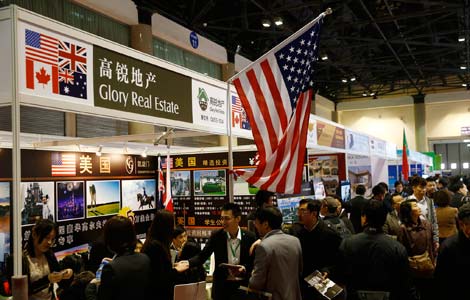Looking to China's logistics market
Updated: 2013-07-01 09:05
By Shi Yingying (China Daily)
|
||||||||
China Railway Corp, a spin-off of the former Ministry of Railways, has announced its decision to develop the high-speed rail express business in a bid to make gains in the country's logistics market.
Currently in China, about 80 percent of express deliveries are carried out on the road, 15 percent via air and 5 percent via railway and other modes of transport, according to Hong Houxing, an analyst with Anbang Logistics.
Sun Zhang, a professor from the Urban Mass Transit Railway Research Institute at Shanghai's Tongji University, said the proportion of rail express' share in the country's logistic market only counted for about 1 percent.
"Express delivery by rail will grow for sure in the long run as it's faster compared to road transportation and costs less than cargo flights," said Hong, adding that air freight is also believed to be more vulnerable to weather conditions.
"Take the trail of high-speed rail delivery between Guangzhou in southern China's Guangdong province to Changsha in central China's Hunan province launched last year as example - the cost is 1.5 yuan per kilo, 25 percent less than delivering by air," he said.
Hong said that airfreight is most suited for long-distance express deliveries that need to travel more than 1,000 km; rail is most suited for deliveries in a radius from 500 to 1,000 km; and delivery vans are most suited for deliveries in a 500 km radius.
Though distances between Shanghai, Nanjing and Hangzhou are under 500 km, Hong still believed the new Nanjing-Hangzhou and Hangzhou-Ningbo lines would reshape the country's logistics landscape as they are parts of the essential rail routes to link cities in the Yangtze River Delta to Fujian and Hainan provinces in the south.
"In some foreign countries, many intercity railways are used for cargo transport during off-peak times, such as late at the night, and we can learn from it," said transport professor Sun Zhang. "The hours between midnight and five o'clock in the morning are the busiest for express delivery companies but off-peak hours for riders."
Considering Ningbo's Beilun Port, which faces the vast Pacific Ocean, Sun said stitching Hangzhou and Ningbo together by rail would be fundamental in the development of the country's sea-railway transportation.
However, issues such as inadequate infrastructure facilities and the task of merging the passenger train information system with the express information system need to be sorted out before attaching more freight to passenger trains or converting more passenger trains into freight trains, said Hong.
In the meantime, industry insiders believe that high-speed services free traditional trains for cargo transport and therefore increase transportation capacity for commodities such as coal, steel, rice oil and ore.
Commenting on the launch of the world's longest high-speed rail route from Beijing to Guangzhou last December, Chu Hai, an analyst with Ping'an Securities, said the old route would be able to run more cargo trains after the high-speed service operated.
"Closing a passenger train can add a transport capacity of one-and-a-half to two cargo trains," he said, adding that cargo transportation is more profitable.
(China Daily 07/01/2013 page5)

 Gay pride parade around the world
Gay pride parade around the world
 Four dead in Egypt clashes, scores wounded
Four dead in Egypt clashes, scores wounded
 New NSA spying allegations rile European allies
New NSA spying allegations rile European allies
 Foreign minister makes ASEAN debut as tensions flare
Foreign minister makes ASEAN debut as tensions flare
 Yao stresses transparency in charity
Yao stresses transparency in charity
 NYC's gay pride march for celebration
NYC's gay pride march for celebration
 Massive debt plagues local gov't
Massive debt plagues local gov't
 Looking abroad for better investment
Looking abroad for better investment
Most Viewed
Editor's Picks

|

|

|

|

|

|
Today's Top News
Mixed outlook for EV makers in China and US
Obama to announce new power initiative for Africa
China's June manufacturing PMI falls to 50.1
Putin signs anti-gay measures into law
Mandela remains critical as family feuds
New NSA spying allegations rile EU
Fugitive terror suspect nabbed
Minister makes ASEAN debut
US Weekly

|

|






